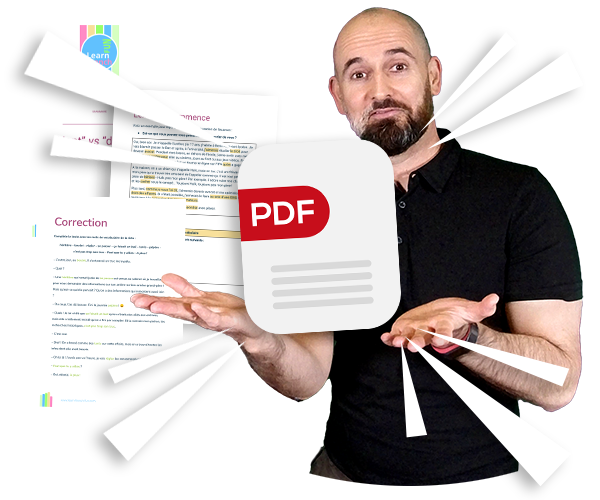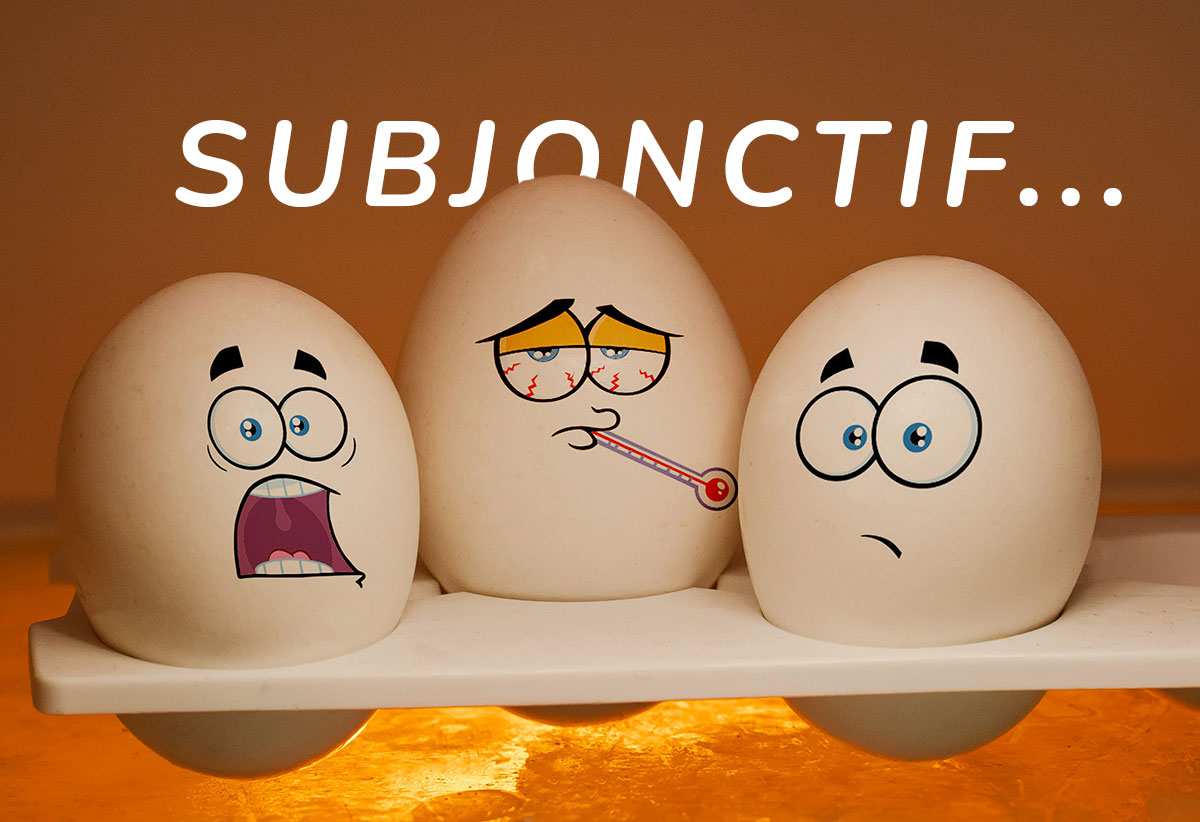As a French teacher, I always enjoy when students can finally understand and use the subjunctive mood correctly. But, even more so, I love it when they can master the 10 irregular verbs in this tricky verb tense!
- What is the subjunctive in French?
- How many irregular subjunctive verbs are there in French?
- First of all, the two verbs in addition: pleuvoir (to rain) – falloir (to have to)
- The 8 irregular verbs in the French subjunctive
- Do you want to practice with irregular verbs in the subjunctive?
- With these 8 irregular verbs there are 3 things you need to pay attention to:
- ✔️ French QUIZ
Yes, there are just 10 of them, but they can be quite tricky to remember. So if you’re looking to improve your French skills and impress your teacher (or yourself), be sure to learn these ten verbs!
Because if you intend to take the DELF B2 exam one day, you should know that the examiners expect you to master conjugation and the use of the French subjunctive.

PDF Bonus
We have prepared a free PDF to help you all about irregular verbs in the subjunctive. 👉 Download it for free
You will find a summary of the lesson, exercises to practice and the correction.
I’ll answer two questions/comments my students give me right away:
– Do the French really use the subjunctive? Yes.
– Not only in writing but also in speaking? And yes!
What is the subjunctive in French?
It’s immediate, when a French teacher talks about the subjunctive the reaction is often the same :
When in fact, the subjunctive in French is not as complicated as that…
First of all, a little reminder of what the subjunctive is? It is a mode (mood). It is one of the 4 personal modes of conjugation in French:
- The indicative,
- the conditional,
- the imperative and
- the subjunctive.
When you speak – first – you should always ask yourself in which of these moods you want to speak, because this will determine the kind of information you will give.
But sometimes you don’t have a choice, because there are elements in your sentence that require you to use a certain mood.
With the subjunctive, you express something subjective, uncertain, like a probability, a doubt, a wish, a desire or like an emotion.
Of course, the explanation of the subjunctive cannot be summarized in what I have just said. There is a lot of information to add, exceptions to detail and even situations where one can choose between the indicative or the subjunctive, depending on what one wants to say.
Yes, in fact, I understand why the subjunctive triggers such a fearful and hateful reaction in students 😂
Do you like learning French with videos?
Receive our free video newsletter every Friday in your e-mail box. You will get 3 “Tips & Tricks” on grammar, vocabulary, phonetics or French culture.
👉👉 Sign up now!
How many irregular subjunctive verbs are there in French?
Let’s look at the irregular verbs in the subjunctive. There are 8 + 2!
Okay, you can’t say: “10”?!
You could also say: “there is a square root of 100”.
Yes 😀 I say: 8 + 2, because the other 2, are verbs that exist only in the impersonal form “il”.
And as you know, the regular subjunctive, for the three persons of the singular (je, tu, il) and the third person of the plural (ils), is formed from the present tense in the form “ils”. And obviously, for these two verbs in addition, there is no “ils” form in the present tense.
That’s why I say: 8 + 2
First of all, the two verbs in addition: pleuvoir (to rain) – falloir (to have to)
As we have just said, these are impersonal verbs that exist only in the “il/elle/on” form.
And in the subjunctive, it gives :
- qu’il pleuve
- qu’il faille
Examples:
L’été est trop sec, il faut qu’il pleuve. (The summer is too dry, it must rain.)
Bien qu’il faille partir, j’ai envie de rester. (Although I have to leave, I want to stay.)
The 8 irregular verbs in the French subjunctive
How lucky you are with these irregular verbs, it’s because they are very used verbs. This way, it’s much easier to memorize them because they are used so often!
1. être (to be)
que je sois, que tu sois, qu’il soit, que nous soyons, que vous soyez, qu’ils soient
Example: Il faut que tu sois gentil avec ta mémé. (You have to be nice to your granny)
2. avoir (to have)
que j’aie, que tu aies, qu’il ait, que nous ayons, que vous ayez, qu’ils aient
Example: Pour que nous n’ayons plus mal à la tête, prenons un médicament. (So that we no longer have a headache, let’s take a medicine)
3. aller (to go)
que j’aille, que tu ailles, qu’il aille, que nous allions, que vous alliez, qu’ils aillent
Example: Il faut qu’elle aille chez le coiffeur. (She needs to get her hair done.)
4. faire (to do)
que je fasse, que tu fasses, qu’il fasse, que nous fassions, que vous fassiez, qu’ils fassent
Example: C’est important que tu fasses tes devoirs. (It’s important that you do your homework.)
5. pouvoir (to can)
que je puisse, que tu puisses, qu’il puisse, que nous puissions, que vous puissiez, qu’ils puissent
Example: Bien qu’ils puissent y arriver seuls, nous allons les aider. (Although they can do it on their own, we will help them.)
6. vouloir (to want)
que je veuille, que tu veuilles, qu’il veuille, que nous voulions, que vous vouliez, qu’ils veuillent
Example: Pour le faire, il faut que tu le veuilles. (To do it, you have to want it.)
7. savoir (to know)
que je sache, que tu saches, qu’il sache, que nous sachions, que vous sachiez, qu’ils sachent
Example:
– Est-ce qu’elle vient ? (Is she coming?)
– Pas que je sache. (Not that I know of.)
8. valoir (worth)
que je vaille, que tu vailles, qu’il vaille, que nous valions, que vous valiez, qu’ils vaillent
Example: C’est fou que ça vaille si cher !
Do you want to practice with irregular verbs in the subjunctive?

PDF Bonus
We’ve put together a free PDF for you to practice with irregular verbs in the subjunctive. 👉 Download it for free
You will find a summary of the lesson, exercises to practice and the correction.
With these 8 irregular verbs there are 3 things you need to pay attention to:
1 – The base of the verb becomes regular again – that is, like the imperfect tense – for: “aller”, “valoir”, “vouloir”.
| aller | valoir | vouloir |
| que nous allions que vous alliez | que nous valions que vous valiez | que nous voulions que vous vouliez |
2 – Phonetics of “avoir” and “aller”
Pay close attention to the phonetics of the verbs “avoir“ and “aller”.
Very often, students try to complicate the phonetics of the verb “avoir” in the subjunctive. No, no, no, it is very simple → the sound (é):
que j’aie – que tu aies – qu’il ait – qu’ils aient
It’s always the same sound!
It is simply for us and you that there is the sound (-ye):
que nous ayons – que vous ayez.
It is for the verb “aller” that the phonetics is mostly with the sound (-ye):
que j’aille – que tu ailles – qu’il aille – qu’ils aillent
And it is for the forms we and you that we come back to a phonetic without the sound (-ye):
que nous allions – que vous alliez.
3 – Endings of “avoir” and “être” in the “il/elle/on” form.
These are the only two verbs that do not have an -e as an ending in the “il/elle/on” form.
We can say that “avoir” and “être” are even more irregular than the other irregular verbs!
In the form “il/elle/on” the ending is not an -e but a -t.
✔️ French QUIZ
Subjunctiv: irregular verbs
Before leaving, let’s take this little quiz together to see if you understand 😀
Results
#1. Il faut que nous (aller) _____ la voir.
#2. Bien que tu le (savoir) _____ déjà, je le répète.
#3. Pour qu'il (avoir) _____ son examen, tu dois l'aider.
#4. C'est sympa qu'elle (faire) _____ ça !
#5. Avant qu'on ne le (vouloir) _____, il passera de l'eau sous les ponts !
📌 Free PDF Bonus:
Do you want to do more exercises on Subjunctiv and have the correction? Have a summary sheet of the lesson?
Then download the free Bonus PDF!
In conclusion, if you want to be able to use the subjunctive mood with confidence and without making too many mistakes, then make sure you memorize these 10 irregular French verbs.
And don’t forget that practice makes perfect! So get out there and start speaking French as much as possible – you’ll be impressing your teachers (and yourself) in no time.
À bientôt !
Articles that might interest you:
- The Imperative in French: How to Conjugate Verbs in Imperative? When do You Have to Use the Imperative?
- The 10 Irregular Verbs in the French Subjunctive Mood
- Depuis, pendant, en, il y a, dans
- All the secrets of the French gerund!
- French verb moods
- How to use the tonic pronouns in French?
- How to use “en” and “y” pronoun in French?
- Difference between DONT and DUQUEL in French
- 10 common French verbs conjugated in the present tense. Beware of traps!
- The Direct Object Complement in French (C.O.D.) and direct complement pronouns (le, la, les…)







5 thoughts on “The 10 Irregular Verbs in the French Subjunctive Mood”
Comments are closed.